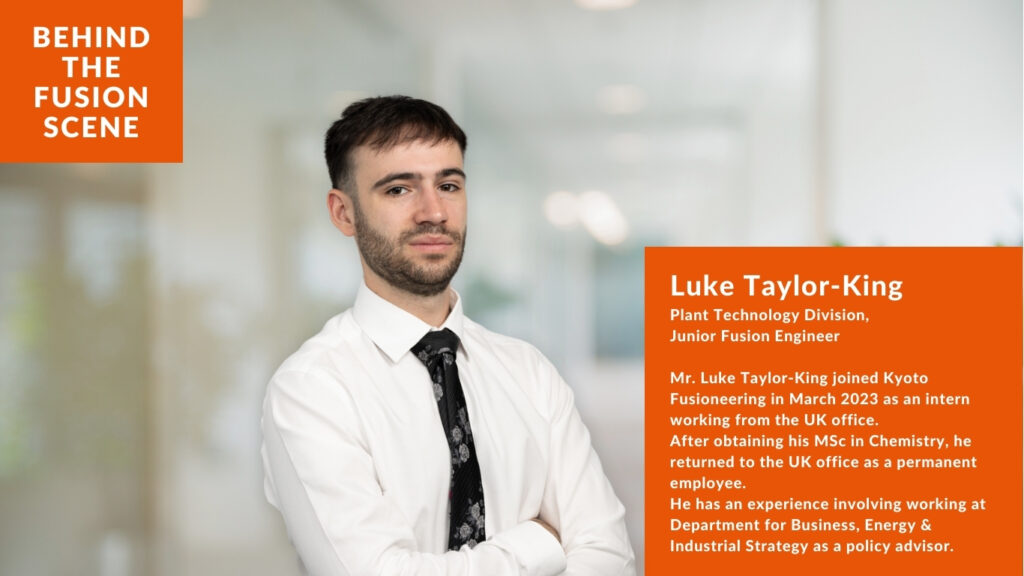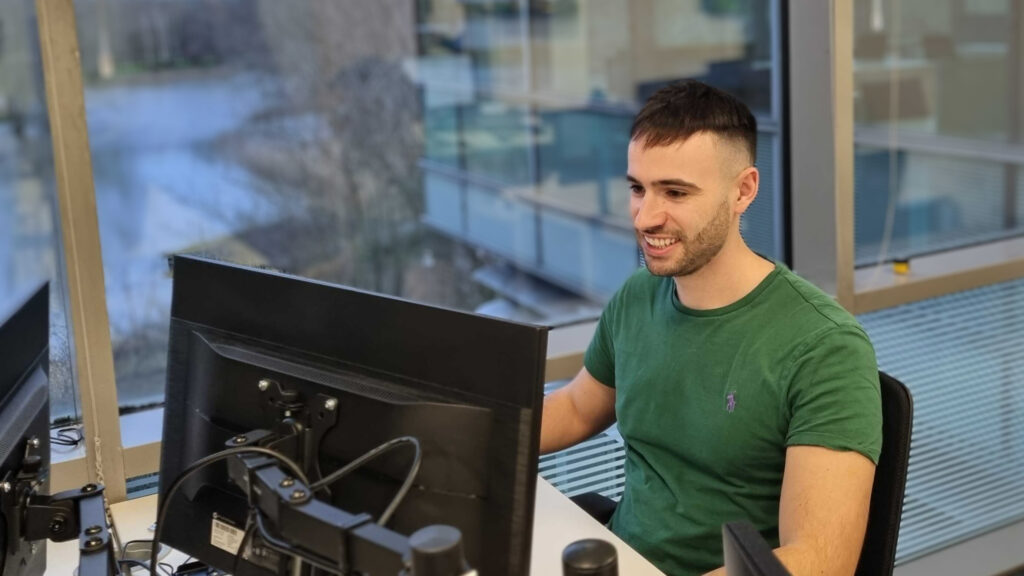
In a nutshell:
Luke’s journey began with a 6-month internship at Kyoto Fusioneering (KF) in the UK, where he showcased his talent as a Chemical Fusion Engineer. This initial success paved the way for a permanent role within the company. In 2020, he achieved an MSc in Chemistry which consequently led to his acceptance onto the Nuclear Graduates programme.
The Nuclear Graduates programme, spanning two years, is aimed at nurturing the future leaders of the nuclear industry through immersive experiences across various sectors. During this programme, Luke undertook diverse roles at Nuclear Restoration Services (NRS) and the Department for Energy Security & Net Zero (DESNZ), making significant contributions to nuclear decommissioning waste characterisation projects and radioactive substances policy, respectively.
Luke’s journey from internship to permanent employment at KF in the UK is a testament to his perseverance, dedication to adding value, and commitment to staying engaged in his field.
What motivated you to join Kyoto Fusioneering and pursue a career in the field of fusion energy?
My interest in fusion traces back to conversations with my grandfather, who spent his career working for the UK Atomic Energy Authority (UKAEA), primarily in metallurgy within the fission industry from the 1950s until his retirement in the 1980s. Despite not having extensive discussions about nuclear technologies with him before he passed away when I was 16, his professional endeavours instilled in me a profound curiosity about the field. Reflecting on this familial connection, I see my interest in fusion as a way of continuing his legacy, albeit indirectly.
Joining KF is more than just a career move for me. It is about rediscovering the joy of learning and exploration that I felt during my university days. Unlike my earlier experiences in the fission industry, which is heavily regulated and process-oriented, the current fusion sector is dynamic, and KF specifically is a place to innovate. KF offers a forward-thinking environment where research and development thrive. In just a few months of interning with KF in the UK, I learned so much in such a short space of time, and I felt motivated to discover more so that I could better myself and the company.
I chose to join KF because I am excited about diving into innovative technologies and helping tackle big problems – and problems that ultimately affect everyone, globally. What was really appealing about joining KF was that it is not just focused on the UK; it is part of a global community. This means we work with people from all over the world, which I find inspiring and important for coming up with innovative ideas. The diversity of perspectives, experiences and cultural backgrounds among KF allows us to approach problems from multiple angles, leading to more comprehensive solutions.
What is KF doing to commercialise fusion and what is your role in the company in shaping that goal?
KF’s business model distinguishes us from other fusion companies in the sector – where they are focused on developing a power-producing fusion plasma, we are focused on developing critical path fusion technology. Our unique position lies in our emphasis on developing the underlying technologies necessary for commercialising fusion, without being tied to a specific reactor design.
Currently, my role primarily involves working on the breeding blanket design, a critical component in fusion reactors. Much of my work revolves around assessing the technology readiness levels of various components within the breeding blanket. By dividing the breeding blanket into distinct technology elements, we can evaluate their readiness for commercialisation and understand the challenges involved in bringing them to market.
This work is vital for informing the design phase, especially given the diverse approaches taken by private companies and organisations in developing fusion technologies. Understanding what works and what does not, is essential for the commercialisation process.

What projects are you currently working on KF?
There are a couple of projects I am involved in. Firstly, I am working on advanced breeding blanket design. As I mentioned previously, my role includes contributing to the technology readiness assessment by conducting extensive research and writing literature reviews on key technology elements. This assessment informs decision-making by assigning technology readiness levels to each component of the breeding blanket. Additionally, I am also engaged in modelling using COMSOL, a multiphysics tool, specifically focusing on magnetohydrodynamics (MHD) analysis and heat transfer. This analysis contributes significantly to the development of effective breeding blanket designs. Whilst just one piece of the puzzle, it’s all working towards our efforts as a company to advance the realisation of fusion energy by addressing the wide array of key technological challenges.
Apart from that, I am also part of the safety team. One upcoming activity involves meeting with UK regulators (Environment Agency and Health Safety Executive), where we will showcase work that we have conducted in relation to fusion safety studies cross-borders with our central safety team in Japan. Our goal is to establish collaborative relationships where regulators seek input from private industries like ours when formulating policies and regulations.
Engaging with regulators early on is crucial. In the upcoming meeting, I will be presenting the advanced breeding blanket design and safety analysis using the Phenomena Identification Ranking Table. This exchange allows us to share our progress and insights while learning from the regulators about their efforts to shape fusion regulations.
Understanding and contributing to regulatory processes are vital for fusion’s commercialisation. It is unlikely that deregulation will ever be fully realised in fusion due to the potential consequences of accidents. Thus, being proactive in shaping responsible regulations is essential for the industry’s long-term success.”
How is the experience at KF helping you grow in skills & opportunities?
One of the primary avenues through which KF has helped my skill development and provided opportunities is by exposing me to collaboration with world-leading experts. When I began as an intern, I was entrusted with responsibilities, delving into challenging projects from the start. It was motivating to see how my team believed in my potential and were eager to push me to grow, offering guidance and support every step of the way. For instance, I was assigned to a consultancy task on waste detritiation, where I collaborated closely with a renowned tritium expert. Working alongside him was a humbling experience, as it allowed me to gain insights into problem-solving at an early stage in my career. Despite first feelings of imposter syndrome, interacting with seasoned professionals in the field of fusion was incredibly enriching, helping me to grow both personally and professionally.
One of the standout opportunities during my internship was the chance to participate in the company-wide in-person 2-day workshop, colloquially called “KF camp”, in Japan in June 2023. This experience involved visiting Kyoto University and seeing experiments up close, such as corrosion testing, which provided valuable exposure to innovative research and facilities that were related to problems I was working on from the design and theoretical perspective in the UK office.
As a permanent employee, I have continued to expand my skill set. Participating in a COMSOL training course, for example, has allowed me to delve into modelling and simulation work, an area in which I had limited prior experience. The knowledge gained from this training is now being applied directly to work packages, complementing my existing skillset, to enhance my contribution to KF’s initiatives.
Your perspective for the future of fusion. What do you want to achieve in KF?
While fusion holds promise for electricity generation, I believe it’s true potential lies in decarbonising other sectors. Many industrial processes, such as steel manufacturing require high temperature, fusion energy can provide heat for these operations replacing the use of fossil fuels. In the broader perspective, I see Kyoto Fusioneering evolving into a technology company that provides key systems to realise a power plant. Personally, I find the opportunity to contribute to solving one of humanity’s greatest challenges incredibly humbling. Fusion energy represents a monumental task, and I take immense pride in dedicating my career to it.
My aspiration is to leverage my background in chemistry to contribute to various aspects of fusion technology, particularly in fuel cycle chemistry and breeding blanket development. Additionally, I am committed to advancing safety measures which will ultimately underpin risk mitigated operations in fusion. My goal is to make meaningful contributions across these three areas, driving progress toward a sustainable fusion future.




